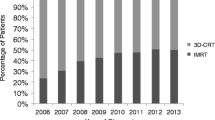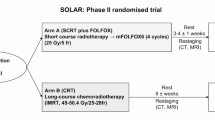Abstract
Purpose
For distal rectal tumors, abdominoperineal resection may achieve local control but with significant morbidity. High-dose radiation can improve pathologic response and allow for full-thickness local excision (FTLE) with comparable outcomes and improved morbidity. We report 15 years of data on distal rectal cancer treated with chemotherapy, intensity-modulated radiotherapy (IMRT), and FTLE via transanal endoscopic microsurgery.
Methods and materials
Forty-four patients were treated for cT1–T3, N0, and M0 distal rectal cancer using IMRT at 5580 cGy with 5-FU chemotherapy, followed by FTLE. Local recurrence (LR), disease-free survival (DFS), and overall survival (OS) were reported.
Results
Median follow-up was 51 months. Three patients (6.8%) had LR, all salvaged surgically. Mean DFS and OS are 8.56 and 9.10 years, respectively. DFS and OS were strongly associated with pathologic response to chemoradiotherapy (p = 0.043 and p = 0.023, respectively). Thirty-four patients (77%) are alive with no disease. Postoperative grade I–II complications noted in 17 patients and grade III complications in 2 patients. No patients required a diverting colostomy.
Conclusions
High-dose IMRT and chemotherapy followed by FTLE to treat distal rectal cancers are well tolerated and effective. FTLE may improve outcomes and minimize complications in appropriately selected patients. Randomized clinical trials are needed to compare it with standard surgery.




Similar content being viewed by others
References
Gérard JP, Conroy T, Bonnetain F, Bouché O, Chapet O, Closon-Dejardin MT, Untereiner M, Leduc B, Francois É, Maurel J, Seitz JF (2006) Preoperative radiotherapy with or without concurrent fluorouracil and leucovorin in T3-4 rectal cancers: results of FFCD 9203. J Clin Oncol 24(28):4620–4625
Hofheinz R, Wenz F, Post S, Matzdorff A, Laechelt S, Mueller L, Link H, Moehler M, Burkholder I, Hochhaus A (2009) Capecitabine (Cape) versus 5-fluorouracil (5-FU)-based (neo-) adjuvant chemoradiotherapy (CRT) for locally advanced rectal cancer (LARC): safety results of a randomized, phase III trial. J Clin Oncol 27(15S):4014
Pozo ME, Fang SH (2015) Watch and wait approach to rectal cancer: a review. World J Gastrointest Surg 7(11):306–312
Guerrieri M, Gesuita R, Ghiselli R, Lezoche G, Budassi A, Baldarelli M (2014) Treatment of rectal cancer by transanal endoscopic microsurgery: experience with 425 patients. World J Gastroenterol: WJG 20(28):9556–9563
Kunitake H, Abbas MA (2012) Transanal endoscopic microsurgery for rectal tumors: a review. Perm J 16(2):45–50
Peeters KC, Marijnen CA, Nagtegaal ID, Kranenbarg EK, Putter H, Wiggers T, Rutten H, Pahlman L, Glimelius B, Leer JW, van de Velde CJ (2007) The TME trial after a median follow-up of 6 years: increased local control but no survival benefit in irradiated patients with resectable rectal carcinoma. Ann Surg 246(5):693–701
Maggiori L, Panis Y (2012) Transanal endoscopic microsurgery (TEM) for T1 rectal cancer. Acta chirurgica Iugoslavica 59(2):87–90
Veereman G, Vlayen J, Robays J, Fairon N, Stordeur S, Rolfo C, Bielen D, Bols A, Demetter P, D’hoore A, Haustermans K (2017) Systematic review and meta-analysis of local resection or transanal endoscopic microsurgery versus radical resection in stage i rectal cancer: a real standard? Crit Rev Oncol Hematol 114:43–52
Lu JY, Lin GL, Qiu HZ, Xiao Y, Wu B, Zhou JL (2015) Comparison of transanal endoscopic microsurgery and total mesorectal excision in the treatment of T1 rectal cancer: a meta-analysis. PLoS One 10(10):e0141427
Allaix ME, Arezzo A, Giraudo G, Morino M (2012) Transanal endoscopic microsurgery vs. laparoscopic total mesorectal excision for T2N0 rectal cancer. J Gastrointest Surg 16(12):2280–2287
Bujko K, Richter P, Smith FM, Polkowski W, Szczepkowski M, Rutkowski A, Dziki A, Pietrzak L, Kołodziejczyk M, Kuśnierz J, Gach T (2013) Preoperative radiotherapy and local excision of rectal cancer with immediate radical re-operation for poor responders: a prospective multicentre study. Radiother Oncol 106(2):198–205
Rödel C, Martus P, Papadoupolos T, Füzesi L, Klimpfinger M, Fietkau R, Liersch T, Hohenberger W, Raab R, Sauer R, Wittekind C (2005) Prognostic significance of tumor regression after preoperative chemoradiotherapy for rectal cancer. J Clin Oncol 23(34):8688–8696
Park IJ, You YN, Agarwal A, Skibber JM, Rodriguez-Bigas MA, Eng C, Feig BW, Das P, Krishnan S, Crane CH, Hu CY (2012) Neoadjuvant treatment response as an early response indicator for patients with rectal cancer. J Clin Oncol 30(15):1770–1776
Habr-Gama A, Gama-Rodrigues J, São Julião GP, Proscurshim I, Sabbagh C, Lynn PB, Perez RO (2014) Local recurrence after complete clinical response and watch and wait in rectal cancer after neoadjuvant chemoradiation: impact of salvage therapy on local disease control. Int J Radiat Oncol Biol Phys 88(4):822–828
Wiltshire KL, Ward IG, Swallow C, Oza AM, Cummings B, Pond GR, Catton P, Kim J, Ringash J, Wong CS, Wong R (2006) Preoperative radiation with concurrent chemotherapy for resectable rectal cancer: effect of dose escalation on pathologic complete response, local recurrence-free survival, disease-free survival, and overall survival. Int J Radiat Oncol Biol Phys 64(3):709–716
Myint AS (2014 Jun) Novel radiation techniques for rectal cancer. J Gastrointest Oncol 5(3):212–217
Gunther JR, Chadha AS, Shin US, Park IJ, Kattepogu KV, Grant JD, Weksberg DC, Eng C, Kopetz SE, Das P, Delclos ME (2017) Preoperative radiation dose escalation for rectal cancer using a concomitant boost strategy improves tumor downstaging without increasing toxicity: a matched-pair analysis. Adv Radiat Oncol
Verseveld M, De Graaf EJ, Verhoef C, van Meerten E, Punt CJ, de Hingh IH, Nagtegaal ID, Nuyttens JJ, Marijnen CA, de Wilt JH (2015) Chemoradiation therapy for rectal cancer in the distal rectum followed by organ-sparing transanal endoscopic microsurgery (CARTS study). Br J Surg 102(7):853–860
Issa N, Murninkas A, Schmilovitz-Weiss H, Agbarya A, Powsner E (2015) Transanal endoscopic microsurgery after neoadjuvant chemoradiotherapy for rectal cancer. J Laparoendosc Adv Surg Tech 25(8):617–624
Mohiuddin M, Paulus R, Mitchell E, Hanna N, Yuen A, Nichols R, Yalavarthi S, Hayostek C, Willett C (2013) Neoadjuvant chemoradiation for distal rectal cancer: 5-year updated results of a randomized phase 2 study of neoadjuvant combined modality chemoradiation for distal rectal cancer. Int J Radiat Oncol Biol Phys 86(3):523–528
Samuelian JM, Callister MD, Ashman JB, Young-Fadok TM, Borad MJ, Gunderson LL (2012) Reduced acute bowel toxicity in patients treated with intensity-modulated radiotherapy for rectal cancer. Int J Radiat Oncol Biol Phys 82(5):1981–1987
Wang JF, Li H, Xiong H, Huang H, Zou YM (2016) Influence of position and radiation technique on organs at risk in radiotherapy of rectal cancer. J Huazhong Univ Sci Technolog Med Sci 36(5):741–746
Zhao J, Hu W, Cai G, Wang J, Xie J, Peng J, Zhang Z (2016) Dosimetric comparisons of VMAT, IMRT and 3DCRT for locally advanced rectal cancer with simultaneous integrated boost. Oncotarget 7(5):6345–6351
Dindo D, Demartines N, Clavien PA (2004) Classification of surgical complications: a new proposal with evaluation in a cohort of 6336 patients and results of a survey. Ann Surg 240(2):205–213
Bosset JF, Calais G, Mineur L, Maingon P, Radosevic-Jelic L, Daban A, Bardet E, Beny A, Briffaux A, Collette L (2005) Enhanced tumorocidal effect of chemotherapy with preoperative radiotherapy for rectal cancer: preliminary results—EORTC 22921. J Clin Oncol 23(24):5620–5627
Winde G, Nottberg H, Keller R, Schmid KW, Bünte H (1996) Surgical cure for early rectal carcinomas (T1). Dis Colon Rectum 39(9):969–976
Lee W, Lee D, Choi S, Chun H (2003) Transanal endoscopic microsurgery and radical surgery for T1 and T2 rectal cancer. Surg Endosc 17(8):1283–1287
Sengupta S, Tjandra JJ (2001) Local excision of rectal cancer. Dis Colon Rectum 44(9):1345–1361
Wong SJ, Winter K, Meropol NJ, Anne R, Kachnic LA, Rashid A, Watson JC, Mitchell EP, Pollock J, Lee RJ, Willett CG (2008) RTOG 0247: a randomized phase II study of neoadjuvant capecitabine and irinotecan versus capecitabine and oxaliplatin with concurrent radiation therapy for locally advanced rectal cancer. J Clin Oncol 26(15_suppl):4021
Guerrero Urbano MT, Henrys AJ, Adams EJ, Norman AR, Bedford JL, Harrington KJ, Nutting CM, Dearnaley DP, Tait DM (2006) Intensity-modulated radiotherapy in patients with locally advanced rectal cancer reduces volume of bowel treated to high dose levels. Int J Radiat Oncol Biol Phys 65(3):907–916
Author information
Authors and Affiliations
Corresponding author
Ethics declarations
Funding
No funding was received for this study.
Conflict of interest
The authors declare that they have no conflict of interest.
Ethical approval
All procedures performed in studies involving human participants were in accordance with the ethical standards of the institutional and/or national research committee and with the 1964 Helsinki declaration and its later amendments or comparable ethical standards.
Informed consent
Informed consent was obtained from all individual participants included in the study.
Additional information
Publisher’s note
Springer Nature remains neutral with regard to jurisdictional claims in published maps and institutional affiliations.
Rights and permissions
About this article
Cite this article
Parikh, K., DeNittis, A.S., Marks, G. et al. Neoadjuvant chemotherapy and high-dose radiation using intensity-modulated radiotherapy followed by rectal sparing TEM for distal rectal cancer. J Radiat Oncol 8, 217–224 (2019). https://doi.org/10.1007/s13566-019-00389-9
Received:
Accepted:
Published:
Issue Date:
DOI: https://doi.org/10.1007/s13566-019-00389-9




